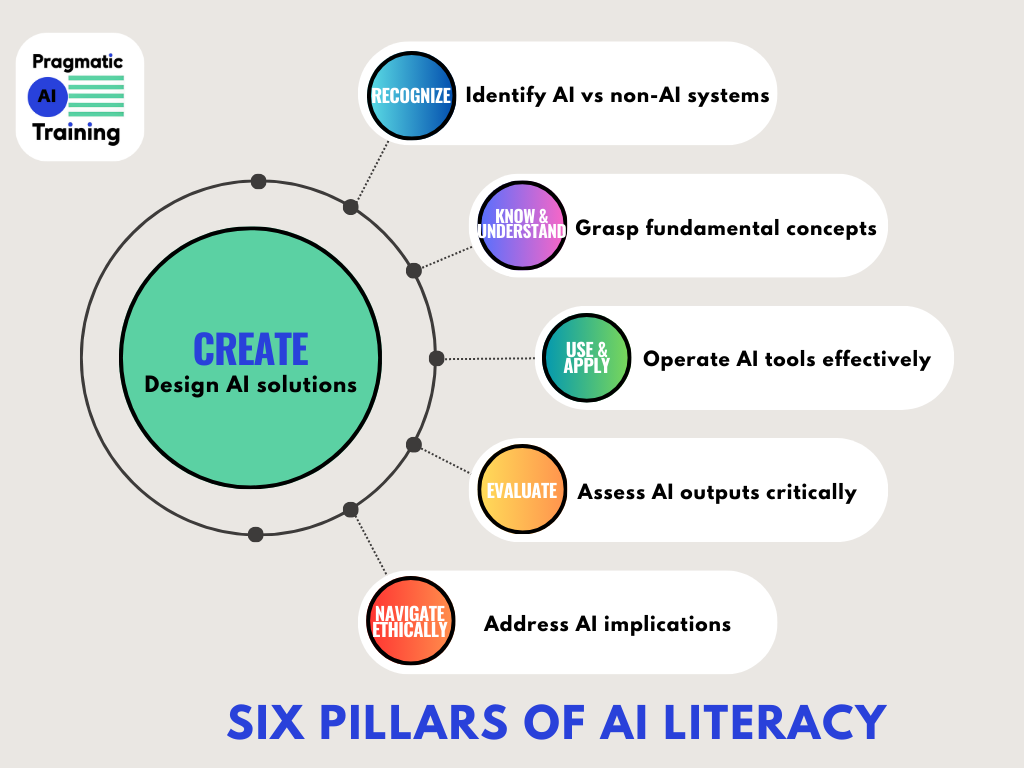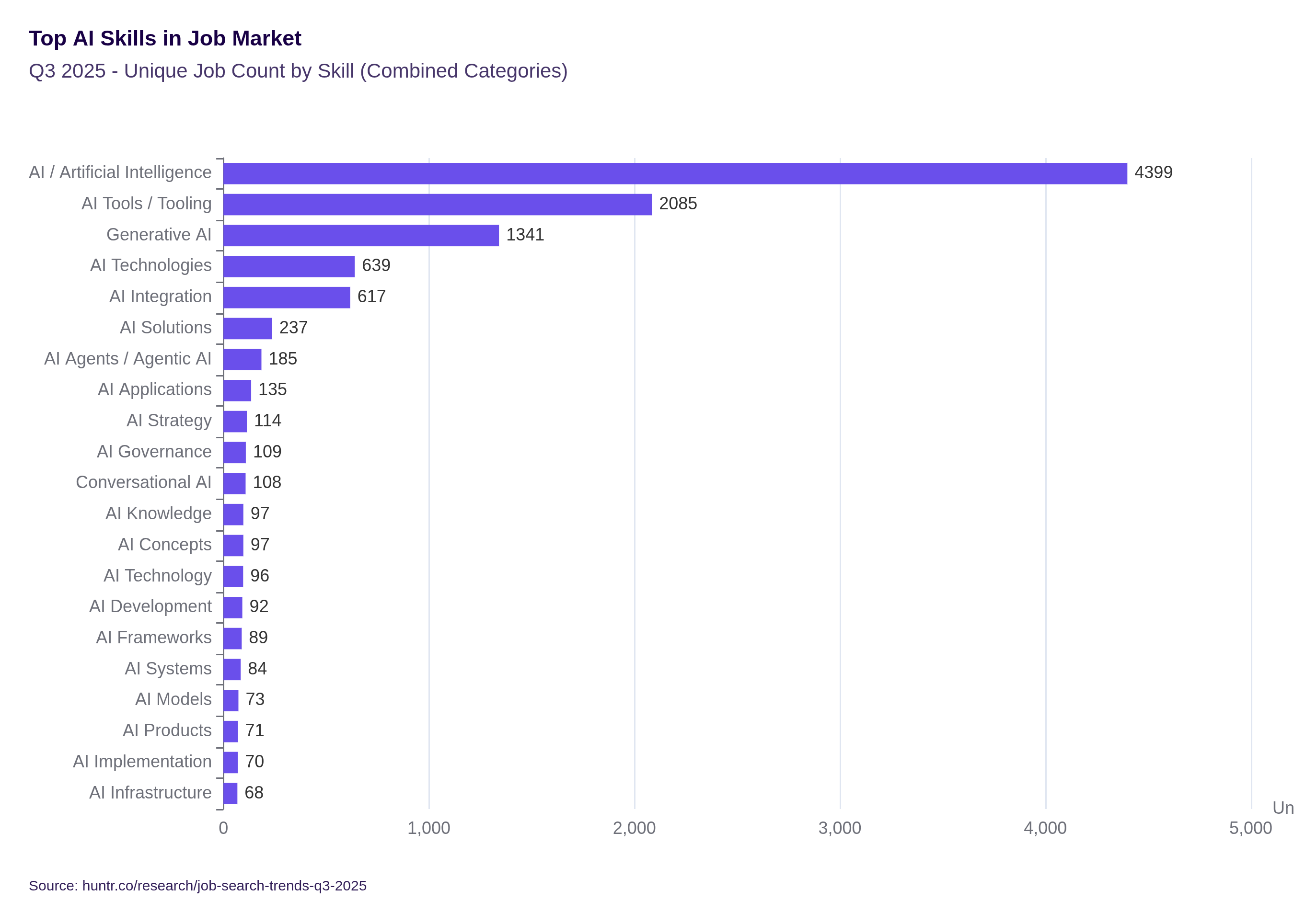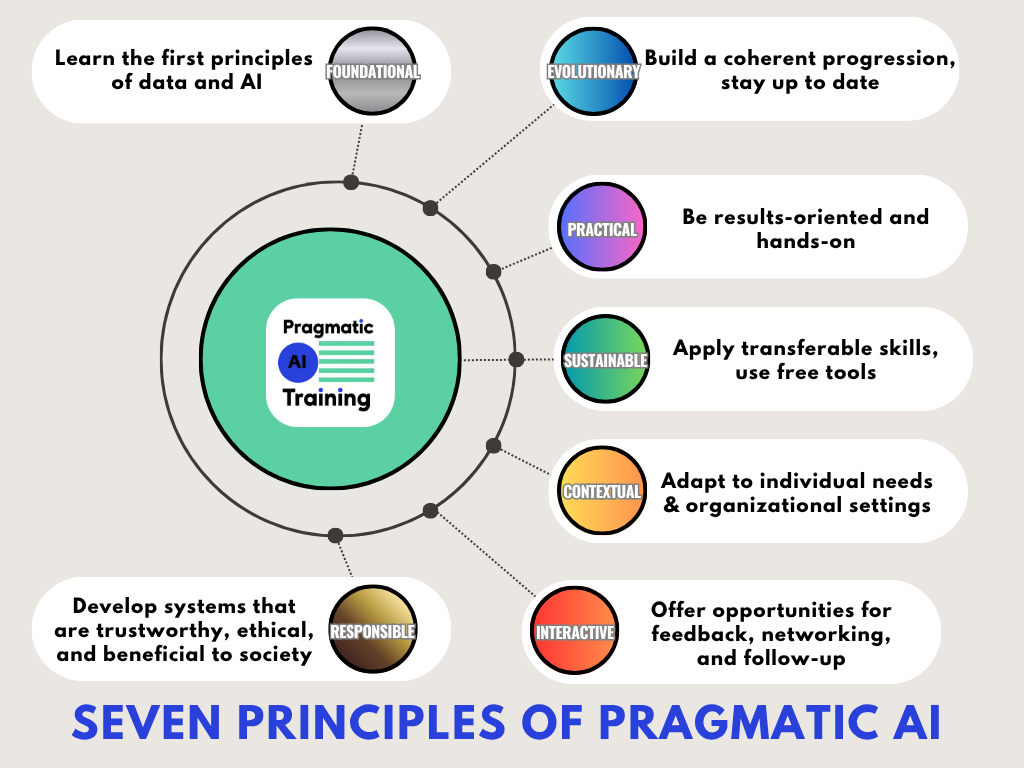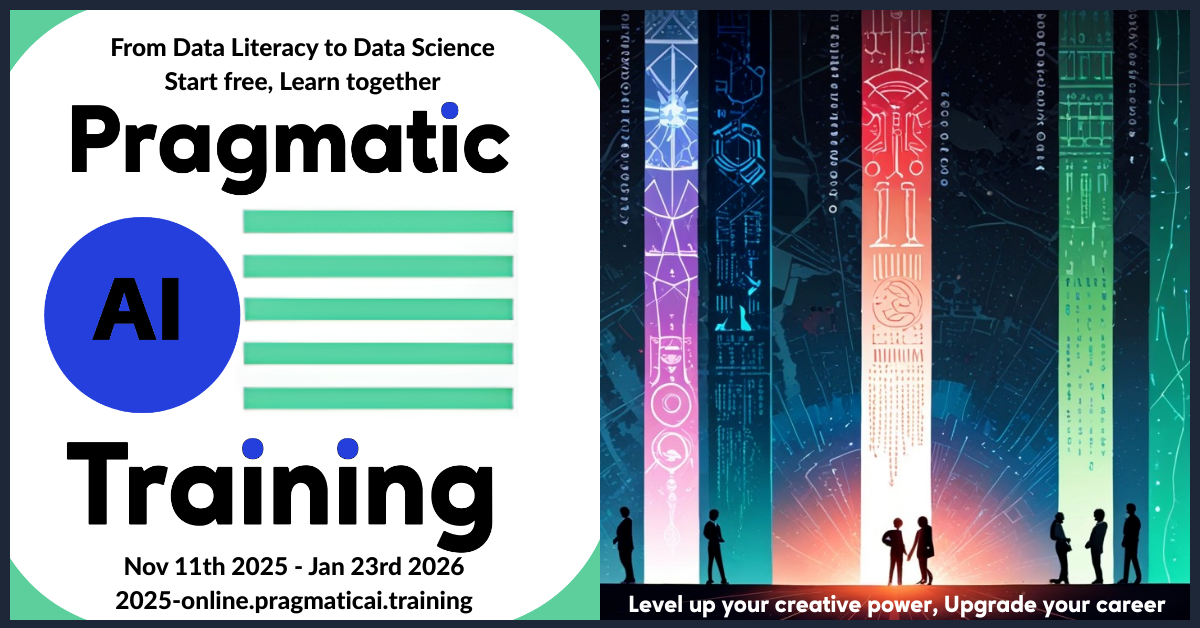The Seven Principles of Pragmatic AI: From AI Literacy to AI Proficiency

Foundational. Evolutionary. Practical. Sustainable. Contextual. Interactive. Responsible.
🧠 You don’t have to be a data scientist to benefit from AI. People who understand AI broadly and can apply it flexibly thrive. This is Pragmatic AI
📚 Start with AI Literacy, and move towards AI Proficiency
👥 Learn the first principles of data and AI, build on a coherent progression and stay up to date applying transferable skills and tools
🙌 Adapt to individual needs and organizational settings, and leverage opportunities for feedback, networking, and follow-up
⚖️ Develop systems that are trustworthy, ethical, and beneficial to society
🎯 The Seven Principles of Pragmatic AI are at the core of the Pragmatic AI Training
Introduction
The journey from AI Literacy to AI Proficiency starts before taking the first step. It starts by meeting people where they are, and finding the right map and companions.
The textbook definition of being pragmatic is dealing with things sensibly and realistically in a way that is based on practical rather than theoretical considerations. But what does being pragmatic mean when it comes to AI, and why does it matter?
Not everyone working with AI today has a background in data science and machine learning. According to Huntr’s Q3 2025 Job Search trends report, in the real world, it’s people who understand AI broadly and can apply it flexibly who thrive, rather than specialists who excel in narrow domains.
Most people are drawn to AI mid-career to meet goals. People need to work with data, achieve results that AI can help with, or are looking for a career change.
Furthermore, AI is not all about data science and machine learning. Therefore, not all AI experts have this kind of background. And that’s fine.
From zero to AI
With a background in computer science, I’ve worked as a consultant, software engineer and architect for years. I spent years in research on symbolic AI and the intersection of distributed systems and knowledge representation and reasoning. As an AI project and product manager and architect, I dove into data science and machine learning.
For the last few years as an analyst, consultant, engineer, founder, researcher, and writer, I have been using AI tools and Large Language Models in a number of ways. I had the privilege of engaging with AI leaders such as Andrew Ng and Gary Marcus.
Pragmatism and the ability to self-learn and adapt have always been my map to navigate challenges. So when I was asked to teach others how to work with AI, the term “Pragmatic AI” framed the approach organically.
The Pragmatic AI Training is a course that evolved through commissioned educational projects for global leaders. It is designed to start from scratch, and take people from AI Literacy to AI Proficiency. AI Literacy has attracted lots of attention, and I have explored how it’s defined and why it’s a requirement in the workplace today.
AI Proficiency is not as clearly defined, and it’s not a regulatory requirement either. But being able to use AI efficiently to create opportunities and solve problems is something everyone can benefit from. AI Proficiency delivers career benefits for most job seekers.
Step 1: Assessment and AI Literacy
Most AI training programs approach training with a one-size-fits-all mindset. They fail to address the specific needs and starting points of different individuals and organizations. Changing this starts with the first step: assessment.
Drawing from AI Literacy research showing that project-based learning significantly improves understanding across all dimensions, the Pragmatic AI Literacy assessment framework provides a practical diagnostic tool.

There are six pillars of AI Literacy, with ‘Create’ showing a significant, positive effect on all others
It identifies where individuals and teams stand across six critical competencies: Recognition, Understanding, Application, Evaluation, Ethical Navigation, and Creation.
The Pragmatic AI Literacy assessment framework is designed to be fast, accurate, and actionable. This framework does more than generating abstract scores – it delivers recommendations that inform training priorities.
It’s built on academic research into AI literacy constructs. It has been validated by professionals across diverse industries and roles. And it can be completed in under 10 minutes.
Learn by doing: AI is not just for data scientists
Knowing where you are today is the first step. This is what the Pragmatic AI Literacy Assessment framework helps with. Determining where you want to be tomorrow is the next step. This is what the Six Pillars of AI Literacy framework helps with, showing the way from AI recognition to creation.
So how do you go from where you are today on your AI journey to where you want to be?
The best way to learn is by doing. Experience shows that AI is not just for data scientists, and it’s not just about ChatGPT either. There is a way towards responsible, practical, and well-rounded AI.
Consultants, creatives, entrepreneurs, executives, managers and solopreneurs are feeling overwhelmed just trying to keep up with their work. Most of them have tried ChatGPT.
Some of them have adopted it for parts of their work, with varying levels of success. Others have given up. ChatGPT would not be the best tool for every job even if there was nothing wrong with it – and there are many things that ARE wrong with it.
On the other hand, not everyone wants or needs to be a data scientist. What most people really need is to know enough about AI to evaluate what it can potentially do for them, and use it in their work.
People need to have an informed view on AI-related proposals, and manage AI projects and products. They need to master the fundamentals and the practical skill set to level up their ability to ideate, create opportunities and solve problems.
The Seven Principles of Pragmatic AI
The combination of findings of the AI Literacy research, and the ideas and experience accumulated by developing and managing AI projects, reviewing and taking AI courses, as well as developing and delivering AI workshops lay the foundation for Pragmatic AI.
These are the 7 guiding principles for Pragmatic AI:
- Foundational. Learn the first principles of data and AI. With AI moving at breakneck speed, being able to adapt needs a solid grasp of fundamentals.
- Evolutionary. Build a coherent progression and stay up to date. Techniques and tools should be connected, with new ones finding their place in the ecosystem.
- Practical. Be results-oriented and hands-on. Theory is important, but real mastery and utility come from learning by doing.
- Sustainable. Apply transferable skills and use free tools. Access should not be a barrier, and with so many free and open source resources, it doesn’t have to be.
- Contextual. Adapt to individual needs and organizational settings. Building on a clear philosophy and core material enables fine-tuning for the best results.
- Interactive. Offer opportunities for feedback, networking, and follow-up. Building knowledge is better together, and real-world use cases involve many stakeholders.
- Responsible. Develop systems that are trustworthy, ethical, and beneficial to society. Governance, ethics, and compliance are just as important as foundations and practical skills.
Pragmatic AI Training
The Seven Principles of Pragmatic AI are at the core of the Pragmatic AI Training. Created for global leaders, the Pragmatic AI Training is now available online – open to everyone from the comfort of your own desk.
The course begins by establishing data and AI first principles, and teaches skills and tools that are transferable and free to use. It teaches the fundamentals, shows how to apply them in practice, and provides guidance to continue growing.
The Pragmatic AI Training is approachable, designed to get results for busy professionals and organizations of all sizes and shapes. It provides real-world data and scenarios to learn from in an interactive setting. It’s curated and tailored to individual needs, and is delivered live online to a limited seats cohort.
We start with an introduction to Data Science & AI. This module includes classes teaching the fundamentals of AI, data, data science and statistical analysis. It then progresses to exploratory data analysis and visualization and machine learning.
There are hands-on labs introducing the curated datasets and the use cases and tools learners will be working on. We explore the datasets and create a sales forecasting model.
And the best part is – you can get the support you need to get started, and evaluate the course for free. In addition to taking the Pragmatic AI Literacy assessment, you can also book a complimentary AI strategy onboarding session to go over your background and goals.
Pragmatic AI Online Training
Theory and hands-on labs. Limited seats cohort.
The introductory classes and the first lab are free to attend, including access to replays and learning material. To access the course in its entirety you need to go through an application process and purchase an access pass.
From AI Literacy to AI Proficiency
The Pragmatic AI Training progresses with advanced Data Science & AI. This module introduces Machine Learning applications, evaluation and performance. It features labs developing and evaluating more sales forecasting models, as well as models for clustering and classification on numerical and multimodal data.
We work with Natural Language Processing and Generative AI, text and multimodal data, Large Language Models, prompt engineering, RAG, and knowledge graphs.
Next, we turn our attention to governing, modeling, and deploying AI applications. We learn data governance best practices and how to work with a data catalog.
We introduce the fundamentals of data modeling and ontology design, develop a domain data model and use it to refine our RAG application. We review options for AI application development, and then develop and deploy an end-to-end AI application. We examine the role of ethics, governance, and regulation in AI.
Finally, we focus on AI project management and business strategy. We introduce a framework for AI strategy development and tools to document and evaluate use cases. We dive into cost-benefit analysis and evaluate KPIs and ROI for AI projects, and then apply them in practice.
We learn the fundamentals of project, team and budget management in AI projects. An extensive, real-world capstone project brings everything together. We conclude with a review of AI trends, future directions, learning paths and resources, and follow up with feedback and overview.
Success stories, and a fail-safe way forward
The Pragmatic AI Training has been delivered to organizations such as GC Europe and GIZ, providing the knowledge and tools needed to transform the way they work. Feedback has been extremely positive, with attendees appreciating the syllabus and structure as well as the instructor’s expertise.
The course has done more than offer food for thought: it taught hands-on skills people can use in their day-to-day work. There have been follow-up projects leveraging AI, and organizations are building on lessons learned to create opportunities and solve problems.
The Pragmatic AI Training can be delivered both in person and online. The pace and format can be adjusted to match the requirements of the cohort attending it.
The online version of the course is designed to onboard people smoothly, and offers a fail-safe way forward. The Pragmatic AI Literacy assessment framework enables everyone to evaluate their own awareness and mastery of AI. In addition, you can book a complimentary AI Strategy onboarding session.
The 2025 Pragmatic AI Online Training is a moderately paced course, with 4 hours of live attendance every week spread over 2 months, plus access to replays and learning material. The first week is a free for all / open cohort. The next seven weeks are for the committed only cohort.
Let’s start this journey together.
Pragmatic AI Online Training
Theory and hands-on labs. Limited seats cohort.







